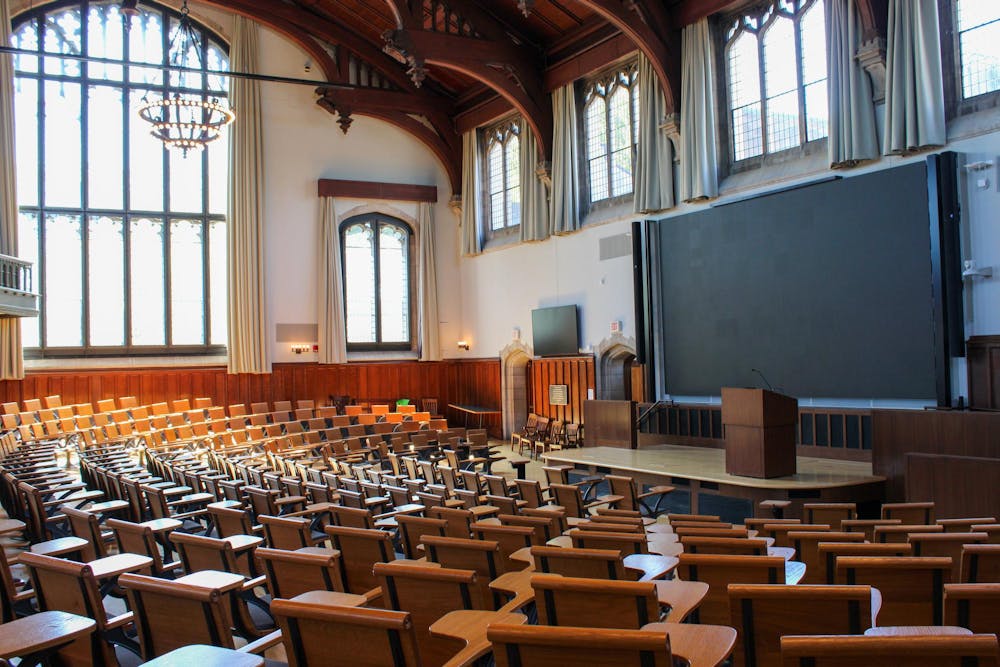During his 2020 campaign for the Democratic nomination, a video of then-Harvard freshman Pete Buttigieg made its way around the internet. In the video, Buttigieg asks Larry Summers — Secretary of the Treasury under Bill Clinton — a question at a talk Summers gave on campus about how American economic policy could hail “a tangible qualitative human improvement worldwide.”
Most viewers were taken aback by the young Buttigieg’s eloquence. I was taken aback because Buttigieg was permitted to stand up and ask a question.
At many of Princeton’s most well-attended political events, it is not attendees that get to decide when they want to ask a question. For some speakers, questioning periods aren’t even built into their events.
It is a real privilege as a student in a changing world to be able to hear speakers from every walk of political life talk about what they think is important. But, fundamentally, these events do not advance discourse on pressing issues if attendees are not given the opportunity to question the speakers. Students deserve the opportunity to ask questions of political leaders who speak on campus, and not just the questions that are pre-selected by a leader’s staff.
Take, for example, Supreme Court Justice Ketanji Brown Jackson’s visit to a packed Richardson Auditorium earlier this month. After spending about half an hour merely reading from the prologue of her new book, Justice Jackson addressed an unprecedented expansion of executive power in vague terms, and then didn’t take any questions from students at the conclusion.
Of course, Supreme Court justices must be careful with their speech, especially if it concerns pending cases in front of the court. But as my colleague Shane McCauley ’28 astutely observed, many students used the event as a half-hearted attempt to engage with the morbid realities of a second Trump term. Being able to ask questions of the Justice — and directly confront the event’s weird avoidance of Trump’s assault on democracy — would have helped students work through the dissonance.
Think back to Harvard freshman Buttigieg. Summers answered his question on American economic prosperity’s worldwide impact by detailing how President Clinton’s budget bill would create market incentives for vaccine production and delivery in developing countries. A question from an undergraduate yielded a substantive explanation of policy choices. Provided the same opportunities during big-ticket speaker events, I have no doubt that Princeton students could ask questions just as — if not more — enlightening.
Admittedly, not all questioning periods are made equal. When Supreme Court Justice Sonia Sotomayor ’76 came to campus to talk with University President Christopher Eisgruber ’83 in Spring 2025, she only answered student questions that were pre-selected, presumably by event administrators and members of her team.

In a more egregious example of guest speakers side-stepping the potential for challenge, when ex-Israeli Prime Minister Naftali Bennett came to campus, students submitted questions, but they were articulated by the event’s moderator. Questions from Jewish people who opposed Bennett were largely condensed into one line of questioning about anti- or non-Zionist perspectives, which Bennett used to simplistically question why a Jewish person would not wholeheartedly support Israel. If confronted by an actual student, rather than a caricature of one, perhaps his reaction would have been different.
Both of these cases relieve the speakers of one of the essential responsibilities of public life: engaging in difficult conversations. If the speakers are selecting the questions, they certainly won’t select questions that make them look bad.
These opportunities to deeply engage with the nation’s political bigwigs are formative to our student body, many of whom will go on to become major political and intellectual leaders. While Pete Buttigieg probably doesn’t remember what he asked Sec. Summers in the fall of 2000, the act of engaging with a leader on an issue important to him (practiced again and again) likely seeded his interest in a political career.
When a department or group organizing an event doesn’t allow students to ask uncomfortable questions of some of the world’s most prominent public servants because of possible repercussions, students lose the ability to engage with leaders — key training for engagement beyond the Orange Bubble.

It can be difficult to convince a speaker to accept questions from a crowd of students. It makes sense why a public figure wouldn’t want to talk about politically dangerous issues. But when questions aren’t allowed, events become devoid of meaning. That doesn’t necessarily mean that they shouldn’t happen — there is something about being in the room with the person — but attendees should be clear-eyed about the fact that the narrative is out of their hands.
Questions about a past record, while sometimes difficult to answer, are essential for holding figures in power accountable. Choosing a public-facing life means facing public scrutiny — especially for those in political power, whose decisions tangibly affect the lives of others. When guest speakers and the programs that invite them micro-manage their events to be as comfortable for them as possible, visits to campus that should be pithy opportunities to engage with complex ideas are rendered self-aggrandizing promotion. If speakers are going to come to our campus and speak to students about tough issues, they should expect tough questions.
Charlie Yale is a sophomore assistant Opinion editor from Omaha, Neb. He can be reached at cyale[at]princeton.edu.








